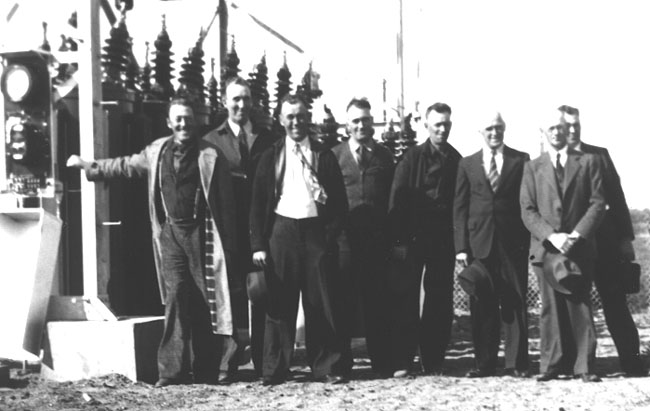Todd-Wadena Electric Cooperative was incorporated in 1940 by a small but dedicated group of people committed to bringing power to our rural area and improving the lives of their friends and neighbors.
Where It All Started
President Roosevelt declared, “The farmer above all should have that power, on reasonable terms, for cheap transportation, for lighting their homes and for innumerable uses in the daily tasks on the farm.” In May of 1935, the Rural Electrification Act (REA) was ordered under Roosevelt authorizing federal assistance to rural America for the purpose of electrification.
During the drought of the late 1930’s the task of soliciting memberships in the Todd-Wadena area began. Membership fees were $5—a sizable investment at a time of such uncertainty. The cost to wire a house or barn was simply out of reach for many. While some farmers viewed the coming of electric power as a saving grace, others considered it just a “pipe dream.” Former Wadena County Extension Agent Miles Rowe said he often wished he had a tape recorder along to preserve some of the conversations in those days. “I recall one meeting held at a farmhouse where the discussion centered on the dangerous aspects of electricity,” Miles shares, “yet I remember how the heat from the kerosene lamp was so intense it was blistering the varnish on the woodwork.”

No one really knew what was in store for us when that first bulb glowed in the home. No one really knew it was to be the beginning of a new way of life. Electricity has gone from being a pipe dream to a status symbol to a necessity of life. Todd-Wadena employees and directors are proud of the cooperative’s rich, 75+ year history and continue to be inspired by a legacy of service that our forefathers founded. Endless possibilities exist where there is cooperation among people.
Todd-Wadena Electric Cooperative’s History
Todd-Wadena’s newly-formed board of directors selected Paul Richter as project coordinator. He served as the co-op’s General Manager from 1940 to 1977.
Attorney Rol E. Barron helped draft the original Articles of Incorporation and Bylaws and Todd-Wadena was officially incorporated after receiving its first REA loan of $237,000.
The first substation with a capacity of 450kW was built near Verndale and energized.
The first lineman, Royale Aarvig, climbed a pole at the J.B. Conley farm to provide electricity to the first residence on the system’s lines. After the first month of operation, 170 members were receiving electricity.
Construction was slow in the early years due to the effects of World War II and the resulting lack of wire and other equipment.
By 1946, TWEC had reach 1,000 members.
Membership hit 3,000 and new building was constructed at present location, moved from Jefferson street.
A two-way radio system was installed, and the cooperative purchased its first post hole digger.
First bucket truck
TWEC now has 1,600 miles of line, 4,000 members, and four substations.
Jon Bellgowan becomes General Manager.
Coal Creek Station Power plant construction began.
This marked the beginning of Todd-Wadena’s successful Dual Fuel heating program, one of the first programs of its type in the state.
This year also saw the start of our monthly newsletter, Pine to Prairie, an addition to Cooperative’s headquarters, and the start of tours to Coal Creek station.
Dale Hendrickson started as General Manager.
The Cooperative reaches 6,500 members.
The TWEC Board of Directors decided to reduce its size from nine board members to eight.
Robin Doege becomes the 4th Cooperative Manager.
The cooperative now has 8,700 members.
The Board of Directors decided to reduce its size from eight board members to seven.
TWEC board adopts local democracy.
Dan Carlisle becomes CEO at TWEC. Carlisle had served as the cooperative’s legal counsel for over seven years.
The cooperative leases it’s first Plug-in Hybrid Electric Vehicle, the Chevy Volt for its fleet.
The cooperative implemented online voting as an option for members to participate in Board of Director elections.
The cooperative implemented an Electric Vehicle Storage rate and Time-of-Use Rate.
